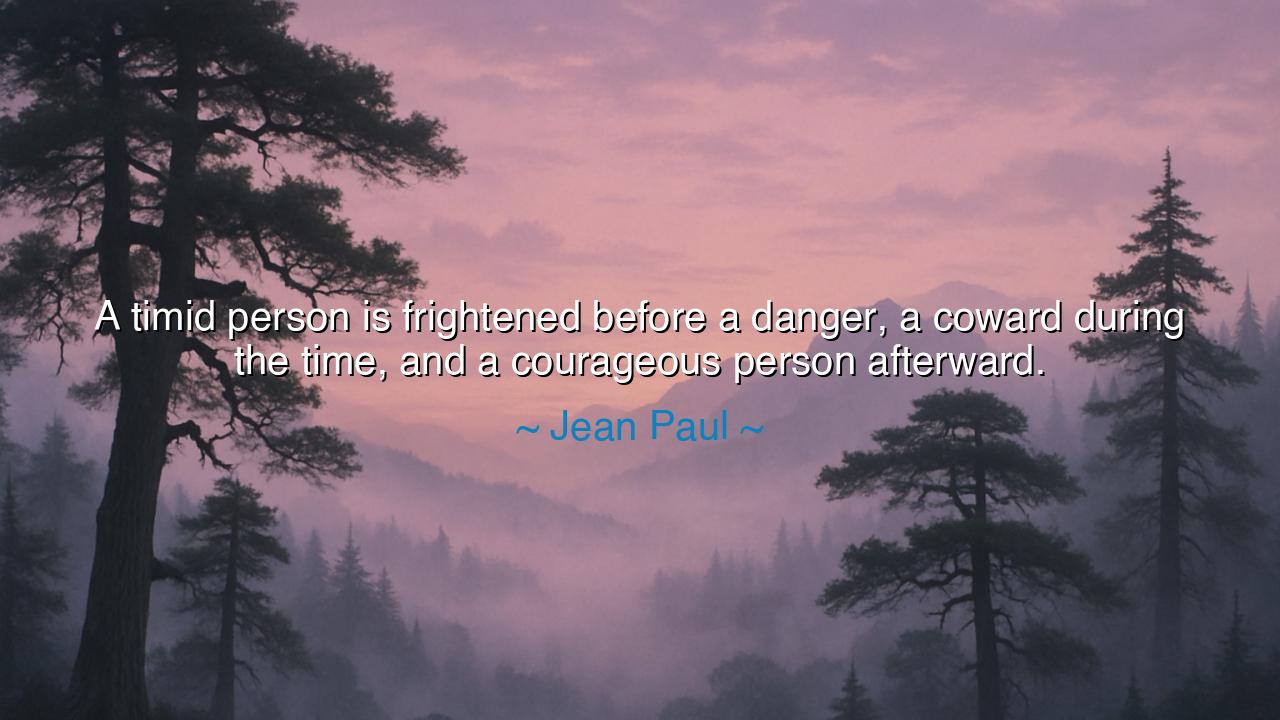
A timid person is frightened before a danger, a coward during the
A timid person is frightened before a danger, a coward during the time, and a courageous person afterward.






“A timid person is frightened before a danger, a coward during the time, and a courageous person afterward.” Thus wrote Jean Paul, the German philosopher and poet of the soul, whose words pierce deep into the heart of human nature. In this brief saying lies an entire study of the human spirit — its fears, its trials, and its redemption. For in the face of danger, man’s soul is divided: one part trembles at what may come, another quails when the peril is present, and yet another — the noblest part — rises afterward in the strength of reflection and gratitude. Jean Paul reminds us that courage is not always seen in the moment of battle, but often blooms in the quiet dawn that follows, when the heart looks back and says, “I endured.”
Born in a time of war and upheaval, Jean Paul observed the weakness and the wonder of humanity. He saw that courage is not a fixed quality, but a journey of the soul through fear. The timid suffer from anticipation — they are enslaved by the shadows of what might be. The coward is crushed beneath the weight of the moment — unable to act, paralyzed by terror. But the courageous, even if they tremble at first, rise afterward in understanding, humility, and strength. Their bravery is not born of fearlessness, but of conquest over fear. Thus, in his wisdom, Jean Paul teaches that courage is not the absence of dread, but the transformation of it into wisdom and peace.
This truth has been seen in every age. Consider the tale of Leonidas and his three hundred Spartans at Thermopylae. Before the great battle, even the bravest among them must have felt the shiver of fear — for they faced an army countless in number. During the clash, as the arrows darkened the sky and death pressed upon them, some might have despaired for a moment. Yet when the last warrior fell, history itself bowed before their courage. The courage of Leonidas was not only in his stance at the gate, but in the spirit he left behind — a courage that lived afterward, in the memory of those who witnessed his defiance and in the generations who drew strength from his example. For true courage, as Jean Paul tells us, is eternal — it survives the danger and outlives the fear.
So too, in quieter times, courage may take humbler forms. When Rosa Parks, weary from labor, refused to give up her seat on that Montgomery bus, she was not without fear. Before the act, she must have felt the trembling of a timid heart; during it, the weight of danger pressed upon her. But afterward — when her single act lit the flame of a movement — her courage shone forth as an immortal force. She became the embodiment of Jean Paul’s wisdom: her bravery was not loud or violent, but reflected through time, growing stronger with every echo. Her act reminds us that even in the smallest soul, courage can dwell quietly, revealing its full power only when the moment has passed.
Jean Paul’s insight also reminds us of the difference between reaction and reflection. The timid and the coward live only within the confines of the moment — they are ruled by emotion, by instinct, by the tyranny of fear. But the courageous person transcends time. He looks back upon his trial and finds meaning in it. He learns that danger was his teacher, and fear his forge. Thus, courage becomes not just survival, but spiritual awakening. It is the realization that we are stronger than our trembling, that our souls can endure what our minds once thought impossible.
This understanding gives rise to a profound peace. When we have faced danger and survived — whether it be loss, grief, or hardship — a quiet bravery settles into the heart. It is not the boldness of arrogance, but the serenity of one who knows his own depth. Such courage does not boast or seek the applause of men; it walks calmly, humbly, with eyes clear and voice steady. It does not seek danger, yet it does not flee from it. It lives with the calm assurance that whatever trials may come, they will pass — and the soul will endure.
Therefore, my children, let these words of Jean Paul be engraved upon your hearts: do not fear your fear, for it is the beginning of courage. If you tremble before danger, you are human. If you falter in the midst of it, you are honest. But if you rise after it, wiser and stronger, then you are truly courageous. Do not judge your worth by the moments when you shook, but by the moments when you stood again. For courage, as the ancients taught, is not the roar of the lion, but the steady breath of the survivor. It is the whisper that comes after the storm — the voice that says, I have endured, and I am not broken.
And so, remember this eternal truth: courage is the salvation of the soul. Fear may visit every heart, but courage is the door through which the spirit walks into freedom. Meet your fears as teachers, your dangers as trials, and your endurance as victory. For in the end, the timid may tremble, the coward may flee, but the courageous — though they tremble and fall — shall rise, and in rising, they shall be redeemed.






AAdministratorAdministrator
Welcome, honored guests. Please leave a comment, we will respond soon